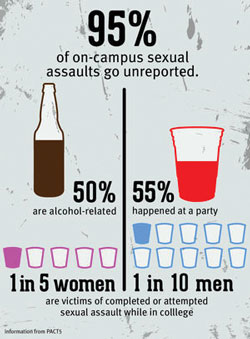A bill, currently awaiting a response from NJ governor Chris Christie, will create a task force devoted to solving the problem of on-campus sexual assault if it is passed.
The bill, currently known as ‘A4156’, would establish a 12 member panel made up of representatives from both state and private colleges and universities, the attorney general, and various other stakeholders.
The bill also requires that at least one member of the panel must have been a victim of an on-campus sexual assault. The group would then have one year to come up with a final report. That report would have recommendations on how to prevent sexual assault on campuses. It would also offer information as to what college campuses could do to increase awareness and understanding.
“It [the bill] was created to the growing number of sexual assaults on college campuses,” said Valerie Huttle, an assemblywoman who was one of the bill’s sponsors. “This is something that unfortunately continues to occur and I couldn’t ignore. I want to make sure that young girls feel protected when they attend school, because they are there for education and self-development. They shouldn’t have to fear something like that happening to them. The statistics say that one in five women will be sexually assaulted on college campus, and even one is too many. I sponsored the bill to promote change on college campuses and to involve institutions of higher education, the state, and leading agencies in this cause to find solutions to this problem. I hope that it will improve how colleges respond to sexual assault cases, and eventually change the culture on campus so that it doesn’t happen.”
One of the main reasons that the bill was created was in response to a higher rate of sexual assault on campus being reported. In 2013, assault reporting reached a ten-year high, with 94 incidents being reported. In addition, experts believe that many assaults go unreported by the victims. A current estimate believes that one in five female college students will experience rape during their academic careers.
“The only way to prevent sexual assault on campus is to change the culture on campus and to do that we need support from the entire higher education community,” said Huttle in an interview with NJ.com.
Nina Anderson, the director of the office of equity and diversity, as well as being the Title IX coordinator on-campus, believes that one of the problems with sexual assault on college campuses is that there is sometimes no clear-cut understanding of consent.
“I think if it happens the way that they are hoping, it would be helpful, because pulling together heads and voices from different campuses throughout the state would be helpful to share information, and to see if we can come up with some ideas and thoughts not only around education and awareness approaches, but also prevention techniques and tactics,” she said. “I don’t know how to do that besides getting students to understand that consent is required, each and every time, ongoing – affirmative consent is required, and that is the message that gets lost in every sexual interaction.”
Anderson also believes that one of the most effective ways to deal with on-campus rape and assault is to focus on educating students on it, so that everyone understands what is considered assault, and what the consequences of their actions could be.
“It has to start from an educational foundation, but they have to find the right way to find that with the student body,” she said. “Sharing it in a way that is palatable and makes sense is a struggle that a lot of universities have trouble with.”
The University recently concluded their sexual assault awareness week, which was dedicated to educating about the subject.
Many more programs are planned to take place during the year, and the online service “Haven” is available at all times. More information about the University’s sexual assault policies can be found online or in the student handbook.
Johanna Foster, assistant professor of political science and sociology, also believes that the bill can have a positive effect on campuses if it is passed.
“I think that any efforts that the Christie administration can take to protect women from rape and sexual assault should be supported,” she said. “I do think that it’s a good idea that the administration look into the problem of rape and sexual assault, because I think it’s a problem that has willfully gone unnoticed by many in our society, and I think that the more attention we give to studying how colleges and universities are addressing the problem, working on prevention, and trying to hold perpetrators accountable, is a good idea.”
Monmouth University students also think that the bill could have a positive impact if it is done correctly.
“As long as they get responses from a range of people, they’ll get different answers, but if they do that, it will be effective,” said Malia Padaliano, a sophomore English student. “If they get as many opinions as possible, it will be even better formed. It impacts everything – higher-ups, students, faculty. Maybe it can give them a clearer idea of how to deal with the problem.”
The bill was passed unanimously through the state Senate on Thursday, Oct. 22. It now awaits approval from Governor Christie.
While Foster does believe that the bill will have a positive impact, she also believes that there is more that can be done by the government and by others involved with college campuses, saying that “I would hope that we get beyond just task forces.”
IMAGE TAKEN from columbiachronicle.com




